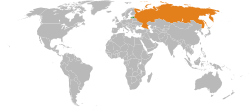| Revision as of 00:10, 28 August 2011 editRussavia (talk | contribs)78,741 edits →History: That the book discusses allegations of this and that is nice and what not, but the fact the book discusses something without any details doesn't belong on this article on bilteral relations.← Previous edit | Revision as of 00:11, 28 August 2011 edit undoRussavia (talk | contribs)78,741 edits →History: bypassing redirect to the actual targetNext edit → | ||
| Line 12: | Line 12: | ||
| In 1920 - 1940, relations between the countries had existed, too (but in 1922 USSR had been founded, which took over the foreign affairs of its member states, including Russia). | In 1920 - 1940, relations between the countries had existed, too (but in 1922 USSR had been founded, which took over the foreign affairs of its member states, including Russia). | ||
| Latvia and Estonia have considered nuclear power as a way to cut their ].<ref></ref> | Latvia and Estonia have considered nuclear power as a way to cut their ].<ref></ref> | ||
| ==Ambassadors== | ==Ambassadors== | ||
Revision as of 00:11, 28 August 2011
| This article does not cite any sources. Please help improve this article by adding citations to reliable sources. Unsourced material may be challenged and removed. Find sources: "Latvia–Russia relations" – news · newspapers · books · scholar · JSTOR (February 2010) (Learn how and when to remove this message) |
 | |
Latvia |
Russia |
|---|---|
Latvia–Russia relations (Template:Lang-lv, Template:Lang-ru) is the bilateral foreign relations between Latvia and Russia. Latvia has an embassy in Moscow and two consulate-generals: in Pskov and Saint Petersburg. Russia has an embassy in Riga and two consulate generals: in Daugavpils and Liepāja.
Both Russia and Latvia are members of UN, OSCE and Council of Europe. They recognize each other since 1991.
History
In 2007, the border treaty between the two states was ratified, after the Constitutional Court of Latvia found it constitutional.
In 1920 - 1940, relations between the countries had existed, too (but in 1922 USSR had been founded, which took over the foreign affairs of its member states, including Russia).
Latvia and Estonia have considered nuclear power as a way to cut their energy dependence on Russia.
Ambassadors
Ambassadors of Russia in Latvia
- Alexandr Rannih (1992–1997)
- Alexandr Udaltsov (1997–2001)
- Igor Studennikov (2001–2004)
- Victor Kalyuzhny (2004–2007)
- Aleksandr Veshnyakov (since 2007)
Ambassadors of Latvia in Russia
- Jānis Peters (1991–1997)
- Imants Daudišs (1997–2001)
- Normans Penke (2001–2004)
- Andris Teikmanis (2005–2008)
- Edgars Skuja (since 2009)
References
External links
- Template:Ru icon Documents on the Latvia–Russia relationship from the Russian Ministry of Foreign Affairs
- Template:Ru icon Template:Lv icon Embassy of Russia in Riga
- Template:En icon Template:Ru icon Template:Lv icon Embassy of Latvia in Moscow
- List of main claims and recommendations of international organizations and NGO to Latvia as regards rights of national minorities Russian MFA, 2004
- Template:Ru icon List of treaties
- Template:Ru icon 1991 treaty (not in force)
- Template:Lv icon 2007 border treaty
- Template:Ru icon Template:Lv icon 2007 treaty on co-operation in the field of social security
- 1920 peace treaty
| Americas |  | |
|---|---|---|
| Asia | ||
| Europe | ||
| Oceania | ||
| Diplomatic missions | ||
This Latvia-related article is a stub. You can help Misplaced Pages by expanding it. |
This Russia-related article is a stub. You can help Misplaced Pages by expanding it. |